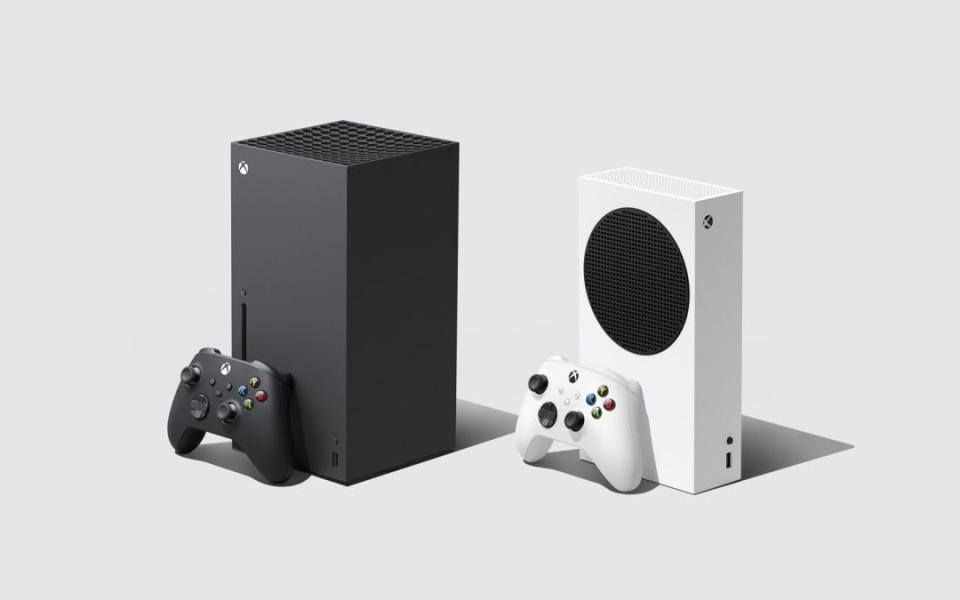Xbox vs PlayStation: the ultimate gaming showdown begins

When Sony unveiled its £450 PlayStation 5 to the world in June, the sleek, futuristic console and demonstrations of the games playing on it earned a positive early reception.
"If the games are going to look this good and run this smooth, I don't mind shelling out," said one reviewer. "It's something different and way better than the brick that's the Xbox Series X," wrote another. Sony's previous console, the PS4, had outsold Microsoft's rival Xbox One two to one, and looked well placed to maintain its lead in the next generation of the console wars.
But even the most fervent fans may soon find a reason to switch allegiance to Microsoft. The company's £449 Xbox Series X and more affordable, if less powerful, £249 Series S are both due to be released on November 10.
On technical merits, Sony and Microsoft's flagship consoles stack up relatively similarly to one another. They promise faster loading times, better graphics and will support gaming on 4K and 8K TVs.

But Microsoft has another card up its sleeve. On Monday, it announced plans to acquire ZeniMax Media, owner of the storied video-game publisher Bethesda Softworks, for $7.5bn (£5.9bn) in cash, its biggest video game purchase ever.
The fee paid for Bethesda almost matches the combined $8bn Disney spent on securing both Star Wars and Marvel, two franchises that have underpinned the entertainment giant's recent success.
“We’re entering a phase of new competition,” says games industry analyst at Ampere Analysis Piers Harding-Rolls.
“With that sort of competitive backdrop, it is vitally important that the biggest companies are defending or growing their positions in the market to have a deep portfolio of owned content and franchises.”
Gaining early momentum in a new generation of console wars is crucially important. In the last generation Microsoft went in with a high price point on the Xbox One and focused on making it a central hub for home entertainment. By comparison, Sony pushed its Playstation 4 at a lower cost and placed its main focus on new games. The result seven years on is that Sony shipped 100 million units of its PS4 console compared to the Xbox’s 50 million.
Microsoft’s move for Bethesda is undoubtedly a message to the rest of the market: this time we’re focusing on the games.
PlayStation has continually stuck to its winning strategy of highlighting its talented first-party studios as its key strength. While neither company has truly managed to communicate the benefit of new boxes yet, Sony has made more noise about the benefits of next-gen.
The Bethesda purchase shifts that dynamic considerably, almost flipping the narrative on its head. It is the latest and most significant part of Microsoft's spending spree on new studios, which now takes its first-party ownership up to 23 developers.
Only this one comes with a stream of proven veterans and high-profile game series with a dedicated cabal of fans. Under Bethesda's umbrella comes its Bethesda Game Studios, famous for Fallout and The Elder Scrolls, Dishonored developer Arkane Studios, Doom creators id Software and Japanese horror specialists Tango Gameworks.
“Historically Microsoft has been through a u-turn,” says Harding-Rolls.
“At one point it was offloading its studios and retreating from the idea of first party content, since 2017 its reversed that approach and its been acquiring studios building up its own first party capability.
“This is a major swoop that gives it a really substantial leg up in that contest bulks out its first party franchises really quite significantly, especially with the traditional console user, those core gamers that are into AAA titles.”

Some of Bethesda's games will still make their way to the PS5 as well as Xbox and PC. Xbox boss Phil Spencer has said that Bethesda will honour the PS5-exclusivity deals of upcoming titles Deathloop and Tokyo Ghostwire and that the platforms of future games will be decided on a "case-by-case" basis.
While games will be the forefront of the battle for console superiority, there is also a fascinating sub-plot that could eventually supercede it - game subscriptions.
For Microsoft, there is the potential of seeing a more significant return on its investment through multiplatform games, while simultaneously highlighting the value of its Game Pass service.
Game Pass, often dubbed the “Netflix for video games”, gives gamers access to a wide range of games for £10 a month. Microsoft’s dedication to it will undoubtedly test the appetite of players to opt for a monthly fee, rather than one-off payments of £70 when games like the next Fallout or Doom arrive.
PlayStation boss Jim Ryan has said that Sony will not be exploring a subscription service with the same veracity as Xbox because he feels it is "not sustainable".
Ultimately, Spencer will be vindicated on his bullish stance if Xbox’s Game Pass proves to be wildly successful.
With a surge in popularity among game streaming - where gamers can play games without first installing them from a disc or download - this could prove to be one of the last generations of console wars. The rise of the technology is encouraging new entrants in the market. Google's streaming service launched last year has had a slow start, but the company has first mover advantage, and Amazon is also set to enter the market.
Microsoft buying up big titles gives it some shield against its new rivals. But soon it is likely to have more than just Sony to worry about.

 Yahoo Finance
Yahoo Finance 